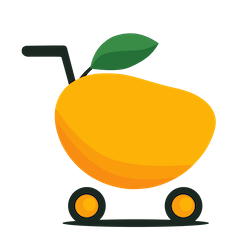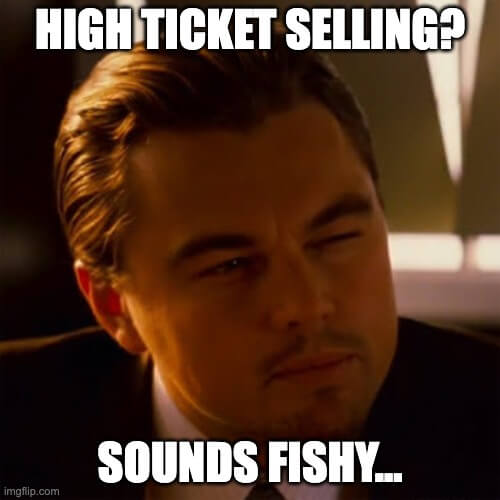
High ticket selling has become a great way for entrepreneurs and companies to make more money and have more impact.
But what is high ticket selling and how can you use it to grow your business?
What’s High Ticket Selling?
High ticket selling means selling premium products or services at higher price points, typically $1,000 or more. Low ticket items rely on high volume sales, high ticket offerings focus on delivering value to a select group of customers who are willing to invest more for better quality or results.
High ticket and low ticket sales are not just about the price. High ticket sales require a more personal and consultative approach that builds trust and shows the value of your offer.
That means spending more time with each potential customer, really getting to know them and showing them how your product or service can make a big impact in their life or business.
High Ticket Sales
High ticket items or services can look very different across industries. They might be:
Luxury goods (e.g. high end watches, designer fashion, premium cars)
Premium services (e.g. executive coaching, specialized consulting, high end travel packages)
Advanced technology solutions (e.g. enterprise software, custom IT systems)
Comprehensive online courses or coaching programs
High end real estate
Exclusive memberships or experiences
What sets high ticket sales apart is the perceived value and exclusivity of these offerings. Customers aren’t just buying a product or service, they’re investing in an experience or solution.
For example, someone buying a luxury watch isn’t just buying a timepiece – they’re buying craftsmanship, status and a piece of history. Someone buying a premium consulting service isn’t just paying for advice – they’re paying for expertise that could transform their business.
The psychology of high ticket sales is interesting. Buyers of premium offerings want status, better quality or big results. They’re willing to pay more because they believe in the value they’ll get. This shift from cost to value is key in high ticket selling.
Think about it this way: If you’re selling a $20 product customers will buy on impulse without much thought. But if you’re selling a $10,000 service customers will think long and hard about the purchase. They’ll want to know exactly what they’re getting, how it will benefit them and why it’s worth the investment. Your job in high ticket selling is to show them that.
Benefits of High Ticket Selling
High ticket selling is a great business model can be super profitable for your business. Here’s why:
1/ Higher profitability
With fewer transactions to reach your revenue goals you can focus on quality over quantity. For example selling one $10,000 package is often easier and more profitable than selling a hundred $100 products.
2/ Quicker ROI
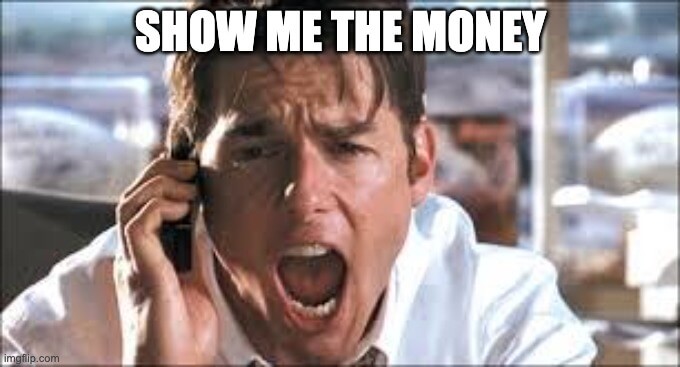
Higher priced offerings can give you faster returns on your marketing and sales investments. You might spend the same to acquire a high ticket customer as a low ticket one but the payoff is much greater.
3/ More resources for customer support
With higher profit margins you can invest in delivering amazing customer experiences. This might mean personalized support, better onboarding processes or extra resources to ensure customer success.
4/ Better clients
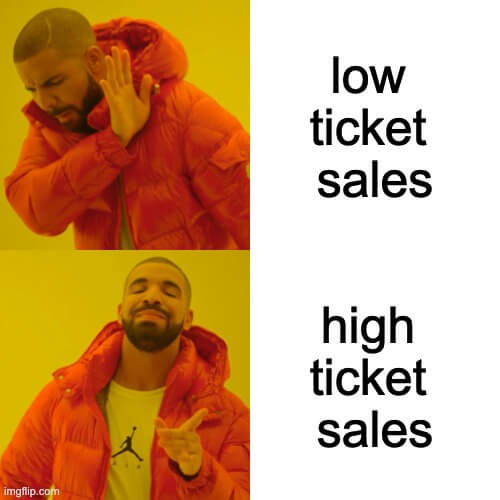
High ticket offerings tend to attract serious committed clients who are a joy to work with. These clients are more engaged, more likely to implement what they learn or use what they buy and more likely to see results.
5/ Less competition
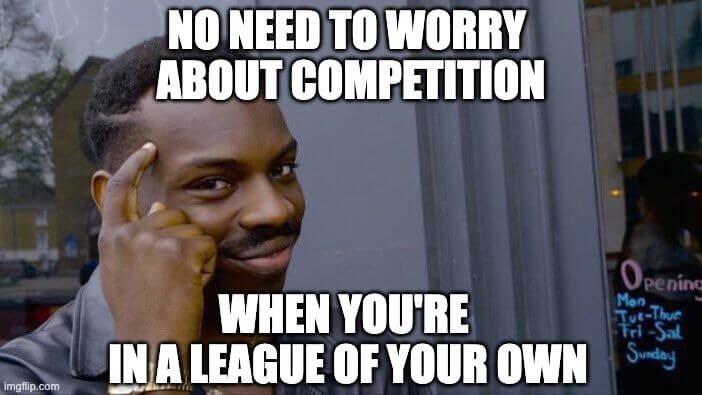
Many businesses avoid high ticket selling because of perceived difficulty. So less competition for those who get it.
6/ Bigger impact
High ticket offerings allow you to create more transformation or results for your clients which means more satisfaction and more powerful testimonials.
Step 1: Who is Your Ideal Customer
High ticket selling starts with knowing your ideal customer. This goes beyond demographics to:
Pain points and challenges they’re facing
Goals and aspirations
Values and beliefs
Buying habits and preferences
Decision making process
Level of awareness about their problem and potential solutions
Creating buyer personas or ICPs (Ideal Client Profiles) can help you get a better picture of your target market. Even though it’s not easy, it’s super worth it.
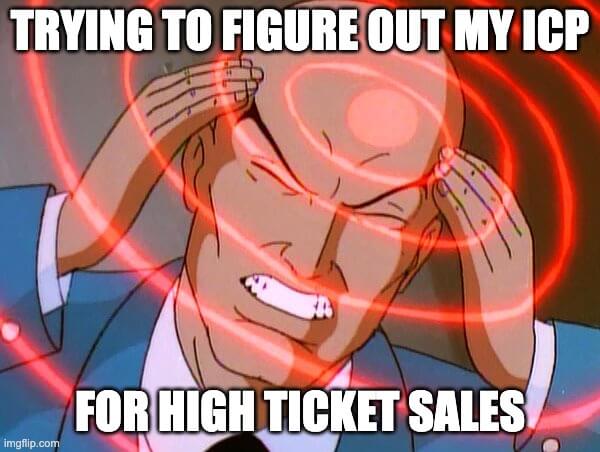
Consider:
Professional background: What industry do they work in? What’s their job title?
Personal interests: What do they do in their free time? What kind of media do they consume?
Financial situation: What’s their income level? How do they make purchasing decisions? What income level is considered “financial freedom”?
Objections they might have: What will stop them from buying your high ticket offering?
For example if you’re selling a high ticket business coaching program your ideal customer might be:
A small business owner with 5-10 employees
Struggling to scale their business beyond $500,000 in annual revenue
Feeling overwhelmed and unsure about the next steps to grow
Values personal development and is willing to invest in themselves
Has tried cheaper solutions without seeing significant results
Want to master high ticket sales? It’s not just about finding customers who can afford your offering. It’s about finding those who will truly benefit from and value what you provide. The goal is to create a win-win situation where your customers get transformational results and you get well compensated for the value you provide.
Step 2: High Ticket Sales Psychology
Building trust and credibility is the foundation of high ticket sales psychology. Here’s how to do it:
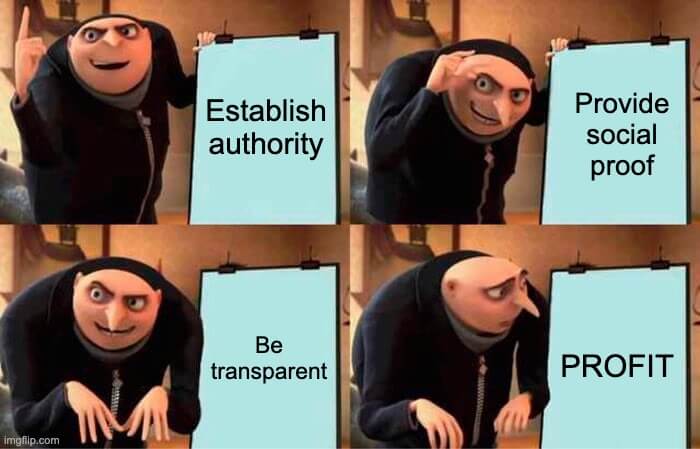
Establish authority
Create content to showcase your expertise – like speaking or writing a book in your field. Share your knowledge freely to demonstrate your mastery of the subject.
Provide social proof
Use testimonials, case studies and success stories to show the results you’ve achieved for others. Real life examples are powerful in showing potential customers what’s possible.
Be transparent
Honesty about what your offering can and can’t do builds trust and sets realistic expectations. Don’t over promise – it’s better to under promise and over deliver.
Practice active listening
Show genuine interest in your prospect’s needs and concerns. Ask good questions and actively listen to their answers.
Demonstrate empathy
Show that you understand your prospect’s challenges and aspirations. Share relevant stories that show you’ve been in their shoes or have helped others in similar situations.
Build rapport
Find common ground with your prospect. This could be shared interests, experiences or values. Most people buy from those they like and trust.
Authentic selling is key in high ticket sales.
This means:
Building relationships not pushing for a quick sale
Asking good questions to fully understand the prospect’s situation
Offering solutions to their specific needs
Being willing to walk away if your offering isn’t the right fit
Remember high ticket selling is not about convincing someone to buy something they don’t need. It’s about helping the right people make an informed decision about an investment that could benefit them significantly.
Step 3: How to Succeed in High Ticket Selling
An irresistible offer
This is key in high ticket selling. Your offer should:
Solve a big problem or fulfill a big desire
Be clear and tangible
Have elements that justify the premium price (e.g. personalized support, exclusive access)
For example if you’re selling a high ticket fitness program your offer might include:
Personalized workout plans
One on one coaching sessions
Exclusive access to a supportive community
Nutrition guidance
Progress tracking and adjustments
Pricing strategies for high ticket items include:
Value based pricing: Price based on the value you deliver, not just your costs. If your program helps business owners double their revenue for instance, it’s worth far more than the time you spend delivering it.
Tiered pricing: Offer different levels of service or features at different price points. This allows customers to choose the level of investment they’re comfortable with.
Anchoring: Present your high ticket offer alongside even higher priced options to make it seem more reasonable. For example you might have a $10,000 option, a $15,000 option and a $25,000 option.
Installment plans: Offer the option to pay in installments to make the investment more manageable for some customers.
When talking about price always frame it in terms of value and return on investment. Help prospects understand not just what they’re paying but what they’re getting in return. For instance if your $10,000 program helps them save $50,000 in operational costs it’s actually saving them money.
Using digital marketing is key to reaching high value clients:
SEO optimization to attract qualified leads searching for premium solutions
Targeted ads on platforms where your ideal customers spend time (e.g. LinkedIn for B2B offerings)
Content marketing to showcase your expertise and build trust
Social media engagement to build relationships and provide value
Email marketing to nurture leads and stay top of mind
Remember in high ticket selling your marketing should focus on education and value provision not just promotion. Your goal is to position yourself as a trusted expert and advisor.
Step 4: Sales Techniques for High Ticket Items
Consultative approach
High ticket sales require a consultative approach. This means:
Asking questions to drill down into the prospect’s situation
Listening more than you talk
Providing insights and education not just information about your offer
Customizing your solution to the prospect’s specific needs
For example instead of jumping into your pitch you might start a sales conversation by asking:
“What’s the biggest challenge you’re facing in your business right now?”
“What have you tried so far to address this issue?”
“If we could solve this problem what would that mean for your business?”
No high pressure sales tactics
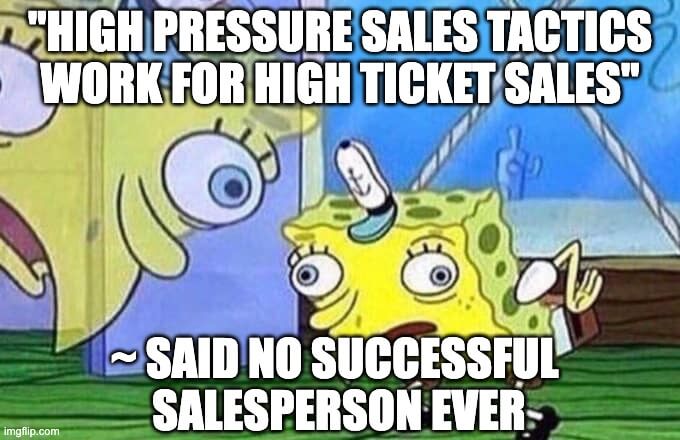
Don’t use high pressure tactics which can erode trust.
Instead focus on:
Building real relationships
Providing value throughout the sales process
Giving prospects time to make an informed decision
Remember high ticket purchases often involve multiple decision makers and longer consideration periods. Be patient and focus on nurturing the relationship.
Personalization
Personalization/customization is key in high ticket sales. This might mean:
Customizing your offer to meet specific needs
Personalized communication and support
Remembering and referencing details about the prospect’s situation
For instance if you’re selling a high ticket marketing service you might develop a custom proposal that addresses the specific challenges and goals the prospect shared with you rather than using a one size fits all approach.
Step 5: Selling A High Ticket Course
High ticket online courses are becoming more and more popular. A successful high ticket course typically:
Teaches a complete system or process
Includes pre-recorded audio and video lessons
Offers additional support like coaching calls or a community forum
Delivers significant tangible results
When creating your course focus on depth not breadth. It’s better to solve one big problem thoroughly than to cover many topics superficially.
Pricing
When pricing your high ticket course:
Consider the transformation you’re offering not just the information
Research competitor pricing but don’t be afraid to charge more if you’re offering more value
Start with a lower price for your first launch then increase as you get success stories and refine your offer
For example you might start selling your course at $1,997 then increase to $2,997 once you have several success stories and testimonials.
Marketing
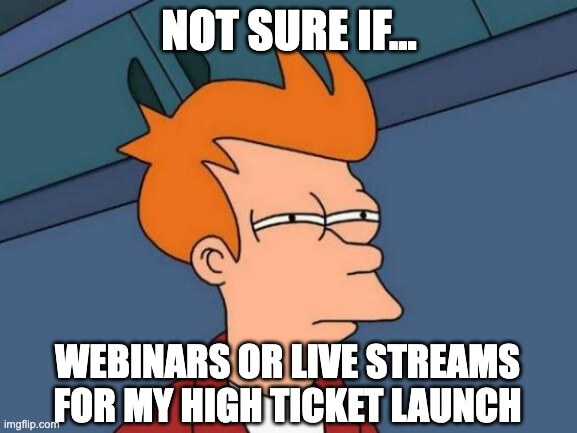
Marketing high ticket courses requires a strategic approach:
Use webinars or live streams to showcase your expertise and the course content
Use email marketing to nurture leads and build hype
Offer limited time bonuses or early bird pricing to encourage action
Use case studies and student success stories in your marketing
Delivering value
To deliver big value:
Continuously update and improve the course content
Provide high touch support to ensure student success
Create an online community where students can connect and support each other
Offer implementation support to help students apply what they’re learning
Remember the key to success with high ticket courses is not just to deliver information but to facilitate transformation. Your goal should be to help your students get real tangible results.
Step 6: Understand The Challenge
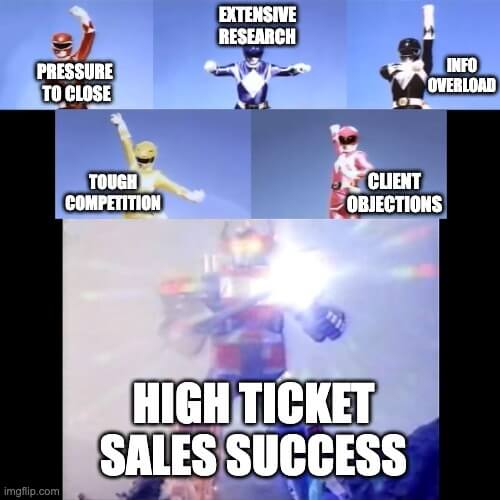
Longer sales cycles
This is normal in high ticket sales. To manage this:
Stay in touch with prospects without being pushy
Provide value throughout the process (e.g. relevant articles, case studies)
Use a CRM to track interactions and follow ups
For example you might set up a nurture email sequence that sends helpful content to prospects every week so you stay top of mind without being too salesy.
Effectively handling objections
Some common objections:
Price: Focus on the value and ROI of your offer. Help the prospect see the cost of not taking action.
Timing: Explore the cost of delay and the benefits of acting now. What are they missing out on by waiting?
Need: Dig deeper to uncover the underlying problems your offer can solve. Sometimes prospects don’t realize the full extent of their problem.
For example if a prospect says your service is too expensive you might respond:
“I get that this is a big investment. Let’s look at the return. Based on what we’ve discussed this service could add $100,000 to your revenue in the next 12 months. Given that, do you think it might actually be costing you money not to move forward?”
Higher customer acquisition costs
Minimize this by:
Focusing on quality leads not quantity
Having a robust follow up system to maximize conversion rates
Encouraging referrals from happy customers
Having a clear ideal customer profile to target your marketing
Step 7: Scaling Your High Ticket Business
To scale your high ticket business:
1/ Create a sales funnel
Attract leads through content marketing or paid ads
Nurture leads with valuable content and personalization
Convert leads through sales calls or webinars
Deliver big results to get referrals and repeat business
For example your funnel might look like this: free webinar, low priced online course or product, high ticket offer.
2/ Automate where you can
Use marketing automation for lead nurturing
Use scheduling software for booking sales calls
Create systems for onboarding and supporting customers
3/ Build a customer centric model
Gather and act on customer feedback
Invest in customer success to ensure satisfaction and get referrals
Create upsells and cross sells to increase customer lifetime value
4/ Build a team
Hire and train sales people who understand consultative selling
Invest in customer support as you grow
Consider bringing on specialists (e.g. copywriters, ads managers) to optimize your marketing
Remember scaling doesn’t just mean selling more. It means creating systems and processes that allow you to serve more customers without compromising on quality or burning out.
Examples
Let’s look at a few real examples of high ticket sales in action:
1/ Luxury Car
Brands like Tesla have sold high ticket electric cars by focusing on innovation, performance and status. They’ve created a unique buying experience from their online configurator to their no haggle pricing.
2/ High End Coaching
Tony Robbins offers coaching packages in the tens of thousands of dollars to executives and entrepreneurs, focusing on transformative results. His high energy events and personal brand have been key to his success in the high ticket space.
3/ B2B Software
Salesforce sell enterprise level CRM solutions at high price points by showing big ROI and custom implementations. They use case studies and free trials to prove the value of their offer.
4/ Online Education
Platforms like MasterClass offer all access passes at premium prices, using celebrity instructors and high production quality. They’ve made online learning a luxury.
5/ Luxury Travel
Companies like Abercrombie & Kent sell high ticket travel experiences by focusing on exclusivity, personalisation and once in a lifetime moments. They justify their high prices with exceptional service and access.
6/ High End Fitness
Peloton have sold high priced exercise equipment by combining it with a subscription for classes, creating a premium home fitness experience.
These examples show how different industries apply high ticket selling principles to create value and justify premium pricing. They all create a unique experience, show clear value and target the right audience.
Summary
High ticket selling can change your business so you can work with your ideal clients, increase your impact and increase your profit. By knowing your audience, building trust, creating offers that can’t be resisted and delivering value you can succeed in high ticket sales.
High ticket selling isn’t just about charging more, it’s about delivering more and getting better real results for your clients.
As you put these strategies into action, remember to keep your eyes on the transformation you’re offering and the problems you’re solving for your customers.
Frequently Asked Questions
How difficult is high ticket sales?
High ticket sales is hard because it requires more from the customer. It’s not just about selling someone, it’s about building trust and showing real value. You need good communication skills, patience and to be able to handle objections.
It takes longer to close and you’ll get more rejections. But with practice and the right approach it gets easier. The key is to solve the customer’s problems not just push a product.
How much is considered “high ticket”?
The definition of “high ticket” can vary depending on the industry and context. Generally anything over $1,000 is high ticket.
But in some industries like luxury real estate or enterprise software high ticket can start at $10,000 or even $100,000. It’s not just about the price tag though.
High ticket items usually involve a bigger decision making process for the buyer and offer more value or transformation.
Can you really make money with high ticket offers?
High ticket sales can be very profitable. Since you’re selling higher priced items you can make more money with less sales.
For example selling 10 x $2,000 is the same as selling 100 x $200. This means you can focus on better service to fewer clients.
But remember high ticket sales often requires more time and effort per sale. The key is to balance the higher profits with the increased time investment.
What is an example of a high ticket?
High ticket items can be found in many industries. Some examples are:
Luxury cars (like a Ferrari or Bentley)
High-end real estate
Enterprise software solutions for big companies
Exclusive travel packages or experiences
Premium coaching or consulting services
High-end electronics (like top-of-the-line computers or home theater systems)
Luxury watches or jewelry
These are usually expensive and offer premium quality, exclusivity or significant value to the buyer.
What are high ticket courses?
High ticket courses are premium online learning programs that cost $1,000 or more. They usually provide in-depth training on a specific topic or skill.
They offer more than just information – they might include personal coaching, community support or done-for-you resources. High ticket courses are designed to deliver big results or transformation for the student, for the higher price.
Examples are advanced business coaching programs, intensive coding bootcamps or exclusive masterclasses with gurus.
CartMango will save you a lot of $
CartMango — our cart/checkout app will save you a lot of money because we don’t charge you transaction fees. We only charge a fixed monthly fee.
Say you sell a high ticket coaching program for $5,000. A platform like Gumroad charges you 10%. That’s $500 you’d have to pay for a single transaction. With CartMango, you only pay a flat monthly affordable fee regardless of how much you earn.
Plus, CartMango is especially made for coaches & course creators.
Sources
Thanks to Imgflip for the pictures.
Related
- Abandoned cart email templates
- Digital marketing terminologies and acronyms
- Affiliate marketing stats you should know
- Ideas for your next online course
- Creating an online course in the form of a simple PDF
- Expenses to know before building your online course
- Which video hosting solution for your online course?
- Reselling digital products
- 30-Day to successful digital publishing
- Solopreneur coaching
- Start & grow a coaching business
